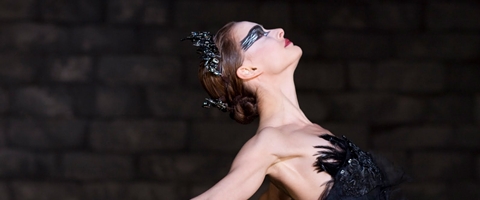I often wonder how important genres are where movies are concerned. Though Darren Aronofsky's work transcends easily explainable scenarios, one can still sum up his films without too much effort. (The Fountain is...) Black Swan is best described as a psychological thriller, but what this does is make other psychological thrillers look slight and clumsy. This is the case with almost any applicable label one uses. Doppelganger ballet horror? Look no further for the best. There are no ugly ducklings here. Just a beautiful Black Swan waiting to eat you alive from the inside out. Nina Sayers (Natalie Portman) is a dedicated ballerina whose name should have been as singular and representative as the character herself. Something like "Ima Repressedperson." She dances for a ballet company whose director, Thomas Leroy (Vincent Cassel), is criticized in-house for stale productions showcasing the aging Beth Macintyre (Winona Ryder), his prized dancer. To change things up, Thomas plans to produce a stripped-down version of the classic Swan Lake. All he needs is a new leading lady, and from Beth's shadow, Nina emerges.
Portman's performance as Nina is more tightly wound than a guitar's sixth string, delivering the same kind of piercing highs. Her constantly quiet and prim repose implies peace and normalcy, but far more distressing things are guiding her. She lives with her mother, Erica (Barbara Hershey), a former ballerina whose hopes and dreams survive in living vicariously through her daughter. In her spare time, her interests include filling her bedroom walls with portraits of Nina and sobbing. Hershey could have mothered both Norman Bates and Carrie White in her sleep. This rattled familial relationship is the foundation from which the tortured Nina is erected.
Always the perfectionist, Nina practices endlessly; routine is her muse. Thomas' Swan Lake shall have one ballerina in the roles of both the antithetical White and Black Swan, and this dancer must succeed in portraying these mirroring personalities. White equals purity, and Black equals danger. Enter danger in the form of Lily (Mila Kunis), the breezy and carefree dancer from San Francisco. (Hippies, man.) Lily's humanism rivals Nina's robotic instincts in every way. So threatened is Nina by Lily's presence that she slowly succumbs to an irrepressive insanity. At least that's what I'm assuming. This transformation is what the movie is all about, right?
Black Swan's screenplay, co-written by Mark Heyman, Andrés Heinz, and John J. McLaughlin, excels in its perfect measure of exposition and mystery. Aronofsky's direction and Andrew Weisblum's editing hint at many things, but explain almost zero. The complexities here all arise from Nina's fucked up perspective, so viewers are meant to second guess what they're seeing and hearing. Aronofsky plays with mirrors and faces often during the film, causing double takes at every rapid edit. The perpetual reoccurrence of camera trickery and visual misdirection is extremely effective and off-putting. There are times when it seems everybody on screen sort of looks like Natalie Portman, and then a few seconds later Portman herself is unrecognizable. That sentence makes sense if you've seen it.
When Portman is the one onscreen, she's almost always grimacing. (Grimaces = awards.) Her mental pains are certainly obvious. It's the physical pains that add further darkness and oddity. Beyond the strenuousness of being a ballerina in general, scratches appear on Nina's back, the product of what might or might not be self-mutilation. As Nina's muffled id is allowed a chance to breathe, these and other physical abnormalities persist. Or do they? That's enough rhetorical questions, Aronofsky and Co.
To break Nina's walls down, Thomas predictably uses aggressive sexuality. As their "friendship" progresses, Lily uses peer pressure to get Nina to smoke a cigarette and go out clubbing. Before you think this is drifting into after-school-special territory, there's also sexuality with Lily as well. Did I even have to tell you that, internet subscriber? As Nina's black swan evolution continues, she allows the negative human traits to take over as well, such as jealousy and disobedience. She thinks Lily is trying to weasel her way into the leading lady spot. This really does sound like Jr. High female drama, if Jr. High had music this haunting, instead of whatever bullshit those kids are listening to these days. Tchaikovsky's original music stands true, as tinkered with to minimalize or maximize whatever is going on within the scene.
If anything I've said above sounds disparaging to you, that's not my intention. I think Black Swanworks on all levels. The conceptually simple story becomes exceedingly more challenging and visually disconcerting. There is even pitch black humor hovering around the wickedness. Aronofsky is restrained here, as he was in The Wrestler, using the limited, forced perspective to his full advantage. One can almost follow the story just by which of Nina's shoulders the camera is behind, changing as her personality shifts. When it swings to the black side, Aronofsky loosens up immensely, resulting in some of the most manic shocks in recent mainstream cinema. I will never watch the ballet on stage, but I have that much more respect for those who inhabit that cultural sector. I don't mind just rewatching Black Swan for the rest of time. The Black Swan Blu-ray has a lot to flap your wings over. The numerous extras look and sound every bit as good as the film itself. There are several enjoyable "In Character With..." features previously seen on Fox Movie Channel. These include three- to six-minute segments from Natalie Portman, Winona Ryder, Barbara Hershey, and Vincent Cassell, where each speaks of their involvement with their characters. "Direct Effect With Darren Aronofsky," also an FMC bit, follows in the same fashion. Hershey's extra stands out for me, just her saying that Erica isn't a healthy person. It's the understatement of the disc.
Your Daily Blend of Entertainment News
"Conversation: Preparing for the Role" and "Conversation: Dancing with the Camera" are short talks between Aronofsky and Portman, mostly about their long-term involvement with the project together, and the challenges of putting ballet into film. "Ballet" is also about the dancing, with a focus on Swan Lake itself. Portman and Aronofsky both get a "Profile" feature, each about five minutes of them talking about mostly the same things, paired with on-set footage. "Costume Designer" is about the shitload of costumes that designer Amy Westcott and the Rodarte ladies put together for the film. "Production Design" has Thérèse DePrez talking about creating both a movie set, as well as the ballet set within the movie.
The biggest chunk here comes from "Black Swan: Metamorphosis," a three-part, 50-minute behind-the-scenes feature. Everything you wanted to know is probably going to be covered here. Lots of conceptual talk, and many members of the cast and crew give their input as to what they got out of the story. That, and a trailer, conclude this fine assortment.
Seeing as how it got so many accolades, I'm sure Black Swan is going to get anniversary discs in the future. That's fine, because this release is already well worth the money. I can't wait for the sequel. (Joke.)

Nick is a Cajun Country native and an Assistant Managing Editor with a focus on TV and features. His humble origin story with CinemaBlend began all the way back in the pre-streaming era, circa 2009, as a freelancing DVD reviewer and TV recapper. Nick leapfrogged over to the small screen to cover more and more television news and interviews, eventually taking over the section for the current era and covering topics like Yellowstone, The Walking Dead and horror. Born in Louisiana and currently living in Texas — Who Dat Nation over America’s Team all day, all night — Nick spent several years in the hospitality industry, and also worked as a 911 operator. If you ever happened to hear his music or read his comics/short stories, you have his sympathy.

